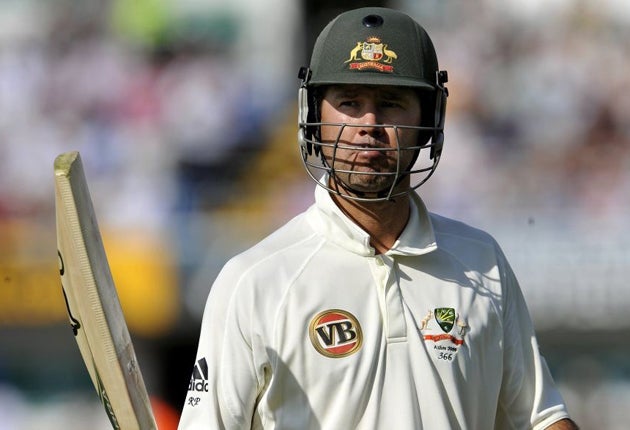Australian angle: Ponting proves a true leader of men

Your support helps us to tell the story
From reproductive rights to climate change to Big Tech, The Independent is on the ground when the story is developing. Whether it's investigating the financials of Elon Musk's pro-Trump PAC or producing our latest documentary, 'The A Word', which shines a light on the American women fighting for reproductive rights, we know how important it is to parse out the facts from the messaging.
At such a critical moment in US history, we need reporters on the ground. Your donation allows us to keep sending journalists to speak to both sides of the story.
The Independent is trusted by Americans across the entire political spectrum. And unlike many other quality news outlets, we choose not to lock Americans out of our reporting and analysis with paywalls. We believe quality journalism should be available to everyone, paid for by those who can afford it.
Your support makes all the difference.Australia stormed back into the series with a sharp and aggressive performance that exposed the weaknesses of an unsettled home side. Ricky Ponting deserves credit for holding himself and his side together in hard times and his reward came as his players produced their tightest, toughest cricket of the campaign. Not that the match is over: Leeds Tests move along in fits and starts.
Ponting's bowlers, catchers and batsmen backed him up and the captain himself played the innings of the day, unfurling scorching shots off the back foot and calmly controlled cover drives. Nor was he flustered as England aimed wide of the sticks. Running between wickets was his weak point.
Unduly loyal to the previous ageing team, Ponting continues to emerge as a respected leader of a relatively inexperienced outfit. He has always known the game but had become bogged down by his inheritance. At last he is the side's senior player and able to put his imprint on it. Even before this turnaround his captaincy was not under threat. Mistakes had been made but he was hardly to blame for the side's predicament.
Two critical decisions lay behind Australia's better showing, one of them audacious, the other belated. Shane Watson and Stuart Clark were in the thick of the action on a typically eventful day's cricket at Headingley. In one case the touring think-tank deserve a pat on the back, in the other a kick up the backside.
Although contentious, Watson's appointment as opening batsman has been a success. From the outset he has looked the part. His technique has improved considerably. Previously as stiff as a starched shirt, he looks more relaxed at the crease and flows through his shots. He has opened his stance as well, and responds to each ball as opposed to applying a formula. In short his spirit and ability have been released. Until they let him bowl, he looks like a good cricketer. Now he must learn to turn fifties into hundreds.
Here Watson set the tone with the bat by square-cutting the first ball of the innings for four. Later he welcomed Steve Harmison back to the popping crease by twice pulling him conclusively to the boundary. Between times he bided his time, presenting a straight bat and letting wide deliveries pass. In short it was a strong innings by a well organised batsman with a clear idea about himself and his game. One up for the selectors.
Clark ought to have played earlier in the series. His problem has been that he was injured in India and concentrated on cutters and other mild-mannered offerings. Surgery on an elbow followed and he had not subsequently played a Test match. Recalled for this tour, he bowled within himself in his first outing and was promptly deemed past it. Not even a sharper showing in Northampton swayed the selectors. Not until desperation settled upon the Australians was the team's best bowler finally let loose.
Keeping an unerring length, the old trouper probed constantly, making the batsmen play, always asking questions. Every breakthrough was important but his third wicket was especially satisfying. Spotting a weakness in Stuart Broad's game, he asked his captain to put a man at deepish short leg, an unusual location. A few balls later the left-hander obligingly pushed the ball straight to the fielder.
By now the speedster had made a nonsense of suggestions that he was over the hill and revealed the folly of his repeated omissions. Although a revived Peter Siddle led the team from the field, it was Clark who broke the back of England's innings.
England beware, men at work...
Has potential but in need of pressing repair due to subsidence, fixtures and Flintoff not included...
Stuart Clark spent five years selling houses in Sydney, managing to shift a couple of "million dollar" ones along the way (that's Aussie dollars so we're talking a tad under £137), and after yesterday England probably wish he'd stayed in his shiny suit chasing closure. And that swinging Ben Hilfenhaus had never given up shifting bricks on a Tasmanian building site, and Peter Siddle had never turned his back on a career as a "promising competitive wood-chopper" (how promising?).
"Real" job experience is rare among international sportsmen these days, but England have been on the receiving end of working men before, most famously when Eddo Brandes, an aggressive, gobby Zimbabwean chicken farmer, took a hat-trick against them in 1997. Geraint Jones has dabbled in pig farming, although only since his England days came to an end.
But nobody (literally?) could top Hanson "the Embalmer" Carter for having the best Ashes-related job. The Yorkshire-born wicketkeeper played 28 Tests for Australia, in between working as an undertaker and was known to arrive at New South Wales games in his hearse.
Robin Scott-Elliot
Join our commenting forum
Join thought-provoking conversations, follow other Independent readers and see their replies
Comments